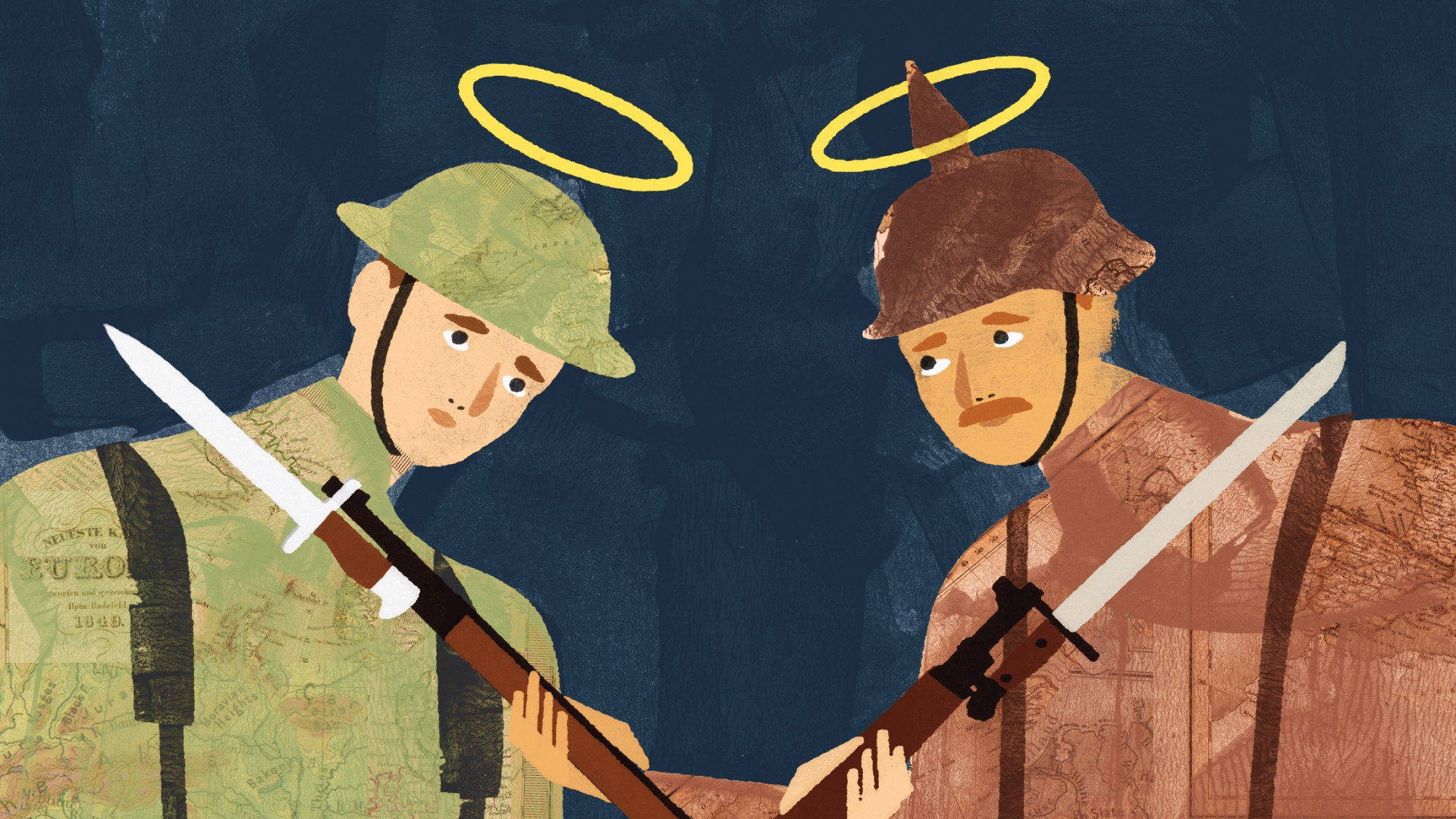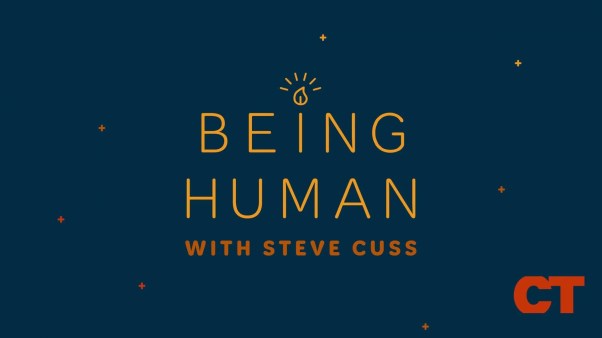This summer marks 100 years since the guns of August 1914 signaled the eruption of an unprecedented global battle. Over the next four years, some two dozen countries would send more than 60 million soldiers to fight. When the guns at last fell silent in November 1918, 10 million men had fallen, and millions more were permanently maimed. Some 7 million civilians had also died, and the physically broken and psychologically scarred were beyond counting.
Shocked by its magnitude, its duration, and above all by its staggering human cost, contemporaries labeled the conflict simply the "Great War." In a historical tour de force, Baylor University's Philip Jenkins demonstrates that participants viewed it as a holy war as well. The story Jenkins faithfully retells in The Great and Holy War: How World War I Became a Religious Crusade (HarperOne) is both engaging and disturbing.
Jenkins's central point is that we cannot comprehend World War I until we come to grips with its essential religious dimension. Religion is central to "understanding the war, to understanding why people went to war, what they hoped to achieve through war, and why they stayed at war." Just as important were the long-term religious consequences. The war triggered "a global religious revolution," Jenkins argues, and in the process "drew the world's religious map as we know it today."
'Hell against Heaven'
"Holy war" is a loaded phrase, and Jenkins is careful to define what he means by it. It goes far beyond what theologians such as Augustine of Hippo and Thomas Aquinas meant by "just war." Just-war doctrine says that, in a fallen world, as a last resort one fallen nation may use deadly force against another to promote long-term peace and avert grave injustice. When nations embark on holy war, in contrast, all moral complexity falls away. The country's cause becomes God's cause. The nation is wholly righteous, its enemies purely evil. Those who serve the nation in battle are the instruments of the Lord. Those who fall before the demonic foe are "sacrifices" and "martyrs."
The details may have varied from nation to nation, but once the shooting started in the summer of 1914, each of the major warring powers wound up embracing the language of holy war. This was more than a little ironic, given that World War I was effectively a civil war among Christians: With the exception of the Turkish Ottoman Empire, all of the leading warring nations shared a common religious ideology. Rather than wrestling with that unsettling irony, however, all sides rushed to condemn enemy nations as ungodly and to "proclaim fellow believers as de facto infidels."
Examples abound. Russians denounced Germany's Kaiser Wilhelm as the Antichrist. German writers equated Britain with the great whore of Babylon described in Revelation. English bishops informed their countrymen that they were God's "predestined instruments to save the Christian civilization of Europe."
Americans were not immune from such ideology. They learned that God was summoning them to war against Germany, calling on them "to grapple in deadly strife with this unholy and blasphemous power." As evangelist Billy Sunday boiled it down for the faithful, the struggle was "Germany against America, hell against heaven."
This was no mere government propaganda. On all sides, clergy rushed to baptize the struggle. Far from merely supporting their respective countries, they became "vocal, even fanatical, advocates" and formulated "sophisticated arguments for holy warfare." Nor did their arguments fall on deaf ears in the trenches. Jenkins pushes back against the common view that, however idealistic civilians may have been, the horrors of battle made soldiers impatient with lofty ideals. To the contrary, Jenkins finds, men on the frontlines were "amazingly open to accepting and repeating . . . exalted interpretations of the war and the demonization of the enemy."
On all sides and in all ranks, criticism of the war from religious leaders was scant. Traditional peace churches like the Quakers and Mennonites did speak out, as did Pope Benedict XV, who publicly lamented "the suicide of civilized Europe." What stands out about such voices, however, is how rare they were. On the whole, Jenkins concludes, Christians found it easy to use "fundamental tenets of the faith as warrants to justify war and mass destruction."
Aftershocks
It was perhaps inevitable that a global war loaded with such religious significance would bring long-lasting religious consequences. But subsequent historical accounts have too often overlooked them. One of the great contributions of The Great and Holy War is its careful survey of the war's religious repercussions. As Jenkins shows, such aftershocks were profound and far-reaching, yet difficult to generalize.
If we focus on the short-term and concentrate on Europe, the conflict's impact seems disastrous. Russia, in 1914, was home to nearly one quarter of the world's Christians; the Bolshevik Revolution and the ensuing murderous upheaval nearly obliterated the Orthodox Church. Germany's dominant Lutheran Church survived, but at the price of compromises with a secular messianic state. Christianity went dormant in both countries, and monstrous ideologies that centered on a different kind of "holy nationhood" filled the void.
Yet our conclusion changes when we shift our attention from Europe to the broader world. Most notably, World War I set in motion events that led eventually to the decolonization of Africa. Christianity in that continent was finally disentangled from the political ideologies of the colonizing powers. Although no one could have predicted it in 1918, African Christianity would flourish in subsequent generations, a trend that shows no sign of slowing: It is assumed that, by the middle of the 21st century, one-third of all Christians will live there. In a parallel development, the war precipitated the collapse of the Ottoman Empire—long the political focal point of Islam. This forced Muslim thinkers and religious leaders to search for a new source of authority. What followed was the eventual rise of modern Islam as we perceive it today: "assertive, self-confident, and aggressively sectarian."
The axiom rings true: We must know the past in order to understand the present. Jenkins's penetrating study of World War I masterfully underscores that abstract truth. As the book repeatedly demonstrates, "the world's modern religious history makes no sense except in the context of that terrible conflict." But history at its best always does more than shed light on the world around us. The best historians give us both a window through which to see the world, and a mirror in which to examine ourselves.
A century ago, Christians across the West enthusiastically rallied to nationalistic causes that wounded Christianity and wreaked untold misery. And they did so using the language of religious fervor that we now associate with radical Islam. As we recall the catastrophe of a century ago, The Great and Holy War reminds us "how easily ideas of the church militarist emerge in times of crisis." May we heed this sobering and necessary reminder.
Robert Tracy McKenzie is professor of history at Wheaton College and the author of The First Thanksgiving: What the Real Story Tells Us About Loving God and Learning from History (IVP Academic). He blogs at Faith and History: Thinking Christianly about the American Past.










